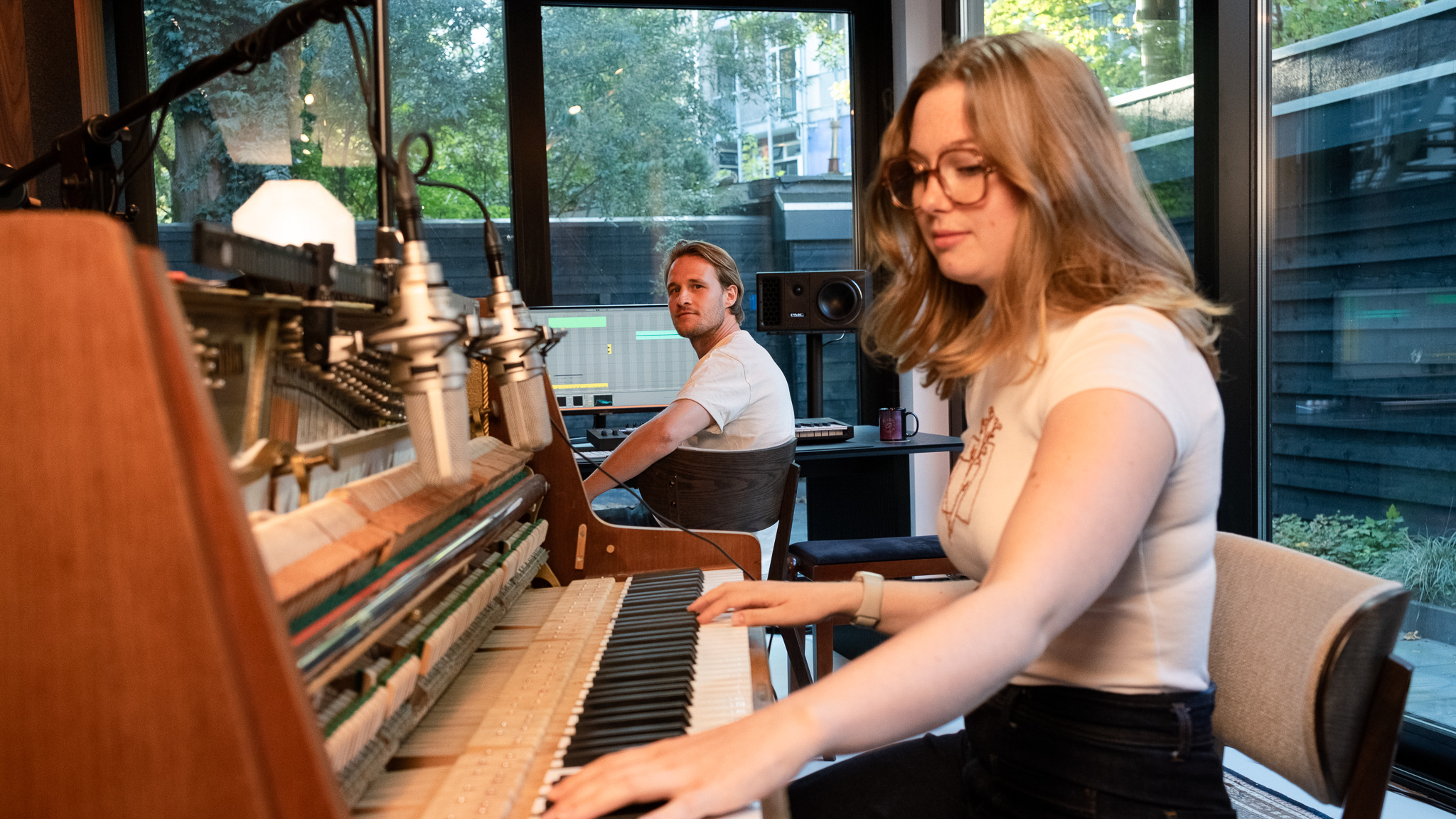Ethereal, Uplifting, and Vibey
That’s how Emma Jackson and Deeparture describe the piece they collaborated on. A fusion of neoclassical piano and deep house energy that surprised them both.
We snuck into the Andante Piano-Disruptive Records studio after their session wrapped up. They shared insights about their collaboration, the contrasts between their genres, and the elements that made this project both fun and successful!
Bringing Two Worlds Together
The collaboration was proposed by our team at Disruptive Records, pairing Emma Jackson, a neoclassical piano composer, with Dominique, known as Deeparture, an electronic producer rooted in house music. Both artists were intrigued but also a little nervous.
“When the Disruptive Records team reached out to me for this collaboration, I was actually pretty excited,” says Dominique. “I’m very much a technical producer myself, but I don’t actually play the piano or any live instrument for that matter. So I actually love working with true authentic musicians. I hadn’t worked with instrumentalists much yet, so I was very happy.”
For Emma, the feeling was mutual, though stepping into unfamiliar territory came with hesitation.
“I was also very happy and very excited,” she admits, “but I was also very nervous because I’ve never worked in sort of the house genre. A lot of my music’s very neoclassical and I’ve always been almost scared to step over that line to house music. So it was really fun and really exciting to merge two very different genres together and just see how that turns out.”
Coming Up with a Hook
The collaboration began with a spark of inspiration.
“Emma already had an idea in her head for some chords,” says Dominique, “and so like literally within the first five minutes we were off and we ended up using at least the basis of that first idea in the song. We started recording chords on the piano, and then as we were layering melodies over the chords, just jamming, at some point the melody completely changed.”
“Exactly,” Emma adds. “We found like a hook. The initial chords that I came into the studio with, we were layering them to start with,” Emma says, “and then eventually over time we basically cut them out and just took the hook and then made new chords.”
“In house music, it’s a bit different from classical,” Dominique explains. “In classical it takes more time to build variations, but in house it needs to be very on point, very hooky. There needs to be a hook that sticks in your mind when you’re on the dance floor.”
Collaborating Together
Despite their contrasting backgrounds, the chemistry was instant and the session full of laughter.
“It was terrible” Dominique and Emma joke.
“No, it was really fun,” Emma laughs. She was really impressed with how Dominique came prepared with this whole house music template, which made it a really smooth process.
“I try to at least have something ready that we can work with immediately,” Dominique says. “So that I’m not swapping claps and drums or finding the right bass sound. There’s just something ready. We got to be creative for most of the session, and not too technical.”
Reflecting on the differences between working together versus alone as a producer, Dominique shares that alone, you get to make all your own decisions and play around with small things for as long as you like.
“But when you’re together, you’re there to create, and you can’t get stuck on the details too much. It forces you to make decisions quicker, which for the creative process is actually better. Luckily, I think we got on quite well with Emma. It was really positive and we were constantly in the flow.”
The Role of the Piano in Electronic Music
Dominique often uses piano in his productions but this collaboration brought a new dimension.
“I actually use quite a lot of piano,” he explains. “I love the combination of strings and piano. But for the dance floor it’s often more synth-driven.”
This was his first session where they actually recorded a real piano live, capturing all the cool variations in the performance.
“For me it was a very cool challenge to make it dancey because I’d like to play it out live, but also keep the subtle vibe of the piano in there.”
As a label that bridges piano and electronic music, hearing Deeparture call the piano the foundation of electronic music felt especially fitting.
“The piano is the basis of everything. Most producers start off with the piano and build around that.”
“Since house music arose in the ’80s and ’90s, the piano, whether it be a real piano or a synth piano, has been center stage, and I think it will remain that way. But modern classical influences, that’s something that could be utilized a bit more.”
Describing their Sound
When asked to describe their finished piece, Emma pauses.
“I’d say it’s quite ethereal,” she says. “There are some vocals and a lot of piano that’s acoustic and recorded live. I’d say it’s quite uplifting as well.”
Dominique jumps in.
“It’s hooky and kind of paradoxical, because on the one hand it’s very atmospheric but we tried to have the main hook be very prominent as well.”
Want to hear the result of their cross-genre project? Listen to ‘Bloom From Silence’ here
Stay Connected:
Follow Emma Jackson on Instagram
Follow Deeparture on Instagram
Subscribe to our newsletter and be the first to know when new stories, blogs, and articles are published.





